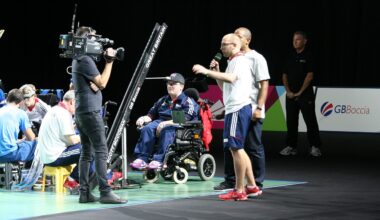Impact of Identity Loss on Athlete Mental Health Post-Injury
In the realm of sports psychology, understanding the mental health implications of injuries on athletes is crucial. When an athlete faces an injury, especially one that sidelines them for long periods, it doesn’t just impact their physical performance; it can lead to significant identity loss. For many athletes, their sport defines who they are, contributing to their self-esteem and self-worth. When this vital aspect of their identity is challenged, emotions such as anger, sadness, and fear become common. Athletes can feel as though they have lost a part of themselves, creating a sense of disorientation and despair. This emotional turmoil may lead to negative coping mechanisms, increasing the likelihood of developing anxiety or depression. They might struggle with maintaining their relationships or engaging in everyday life activities, compounding their isolation. For coaches and sports psychologists, recognizing this identity loss is the first step in providing effective support. Open discussions about their feelings and emotions can create safe environments, promoting healing and emotional recovery while providing practical strategies for coping with such transitions.
Research shows that the psychological impact of injury can lead to a profound re-evaluation of one’s self-concept. This is particularly true for those who have deeply integrated sports into their personal identity. When athletes cannot participate as they did before, it raises existential questions about their purpose. The fear of being forgotten or replaced can exacerbate their distress. In turn, this could diminish their motivation to engage in rehabilitation and recovery processes, further delaying healing. Mental health professionals emphasize the importance of identity transition during recovery. Athletes need to engage in activities that foster a broader sense of self and achievement beyond sport. Psychologists encourage participation in hobbies or education that re-establishes self-worth away from athletic success. Emphasizing personal growth and resilience during recovery is vital for a successful transition back into the sport post-injury. Moreover, acceptance and commitment strategies can be effective in helping athletes embrace their current state rather than resist it, addressing the emotional challenges associated with identity loss. Counseling and peer support can help facilitate this identity transformation into something positive and forward-looking.
The Role of Social Support in Recovery
Social support emerges as a critical factor influencing an athlete’s mental health post-injury. During the rehabilitation process, athletes often require emotional and logistical support from coaches, teammates, friends, and family. This support can help mitigate feelings of loneliness and anxiety associated with their injury. Engaging with others who understand their struggles fosters resilience and helps maintain motivation throughout the recovery period. Studies indicate that athletes who perceive a high level of social support report better mental health outcomes. Understanding the importance of maintaining relationships is vital for athletes to feel connected and valued. Peer support groups can also provide reassurance, allowing athletes to share their feelings and fears regarding their recovery journey. For coaches, fostering an inclusive environment where athletes feel comfortable discussing their experiences can substantially impact their mental health. Encouraging teamwork and camaraderie even during injury can help maintain bonds and provide emotional stability. Moreover, frequent check-ins from coaches and mental health professionals can reinforce this support system, making a significant difference in the athlete’s outlook and motivation to return to their sport diligently.
The rehabilitation journey is often fraught with physical and emotional challenges that require robust mental strategies. Athletes frequently face setbacks that may hinder their recovery and trigger despair. Building mental resilience is vital in overcoming these hurdles and reclaiming their identity. Techniques such as visualization, positive self-talk, and mindfulness practices are beneficial. Visualization helps athletes mentally rehearse their return to sport, providing a sense of accomplishment even before they physically achieve it. Positive self-talk can counteract negative thoughts and reinforce self-identity separate from their athletic performance. Mindfulness practices can assist in managing anxiety, promoting relaxation, and helping athletes stay grounded during tumultuous times. These techniques, often incorporated into rehabilitation programs, facilitate a smoother transition back to sports. Engaging mental health professionals who specialize in injuries can enhance these strategies by providing tailored approaches that resonate with individual athletes. Additionally, regular mental skills training sessions can be intertwined with physical rehabilitation routines to form a comprehensive recovery program. This holistic approach not only emphasizes physical recovery but also prioritizes mental well-being as athletes redefine their identity following injury.
Reconstructing Identity Through Goal Setting
Goal setting plays a pivotal role in the rehabilitation process, offering athletes a path to reconstruct their identity post-injury. By establishing attainable and realistic goals, they can focus on small victories that rebuild confidence over time. These goals should encompass both physical recovery milestones and emotional well-being objectives. For instance, an athlete might aim to complete a certain number of rehabilitation exercises each week and participate in social activities that reinforce their sense of self outside of their sport. By framing the recovery journey in terms of progressive achievements, athletes can transform what may feel like a daunting task into manageable steps. This gradual accomplishment helps reinforce their identity as committed and resilient individuals. Moreover, reflecting on personal values and long-term aspirations beyond sport can guide athletes toward new layers of identity. Engaging in physical activities that they enjoy outside their primary sport maintains their connection to movement, easing the transition back to competitive play. Encouraging a focus on personal growth through goal setting ensures athletes feel empowered and hopeful, cultivating a more robust sense of self during and after their rehabilitation journey.
Understanding the psychological dynamics of injury and identity loss highlights the need for ongoing support throughout an athlete’s rehabilitation journey. It is essential for coaches and sports psychologists to develop individualized plans that address emotional healing and identity reconstruction. Encouraging open communication about fears and challenges can help normalize the feelings athletes experience during recovery. In addition, incorporating mental health awareness into coaching curricula can equip coaches with essential skills to identify mental health issues early in the rehabilitation process. Recognizing and addressing emotional distress promptly can prevent the development of more severe mental health conditions. Ultimately, having structured support networks in place that promote mental health can lead to a more positive recovery atmosphere. This care extends beyond the individual athlete; families and teammates play pivotal roles in redefining identity post-injury. By creating a culture that encourages discussions about mental health in sports, athletes may feel more comfortable seeking help. Such a culture fosters openness, breaking down stigmas and aligning emotional recovery with physical rehabilitation. Establishing these practices early on can significantly reshape athlete experiences post-injury, promoting healthier transitions and fulfilling returns to sport.
Conclusion: Emphasizing Holistic Recovery Approaches
In conclusion, the impact of identity loss on athlete mental health after injury is a profound concern that must not be underestimated. Addressing the psychological aspects of recovery is as crucial as physical rehabilitation. Athletes deserve comprehensive support that tackles their emotional turmoil and assists them in redefining their identities during recovery. The role of coaches, psychologists, and social support networks is paramount in fostering environments where athletes can openly discuss their identities and feelings. Programs that integrate mental health and emotional well-being into recovery strategies can lead to more effective outcomes and satisfaction. Promoting resilience and a broader sense of self will not only facilitate a return to sport but can also enhance overall quality of life. By emphasizing a holistic recovery approach, athletes can navigate their journeys with greater confidence, understanding the dual importance of both mental and physical health. Awareness and proactive measures can make a substantial impact on athletes’ lives, allowing them to emerge from their experiences stronger and more well-rounded individuals, ultimately achieving personal fulfillment in and out of their sport.
This holistic perspective encourages athletes to embrace their unique trajectories and continuously develop as individuals even after facing significant challenges. The journey toward recovery is not just about returning to the field; it’s about evolving in ways that foster resilience and enrich their overall existence.





